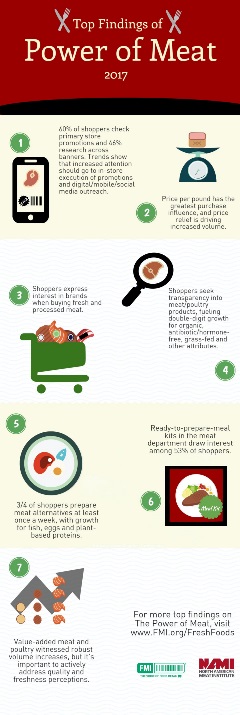FEBRUARY 21, 2017 – DALLAS – After years of increasing prices in a volume-challenged marketplace, deflation is profoundly changing the meat purchase yet again. The Food Marketing Institute (FMI) and the North American Meat Institute (NAMI) today released their annual consumer trends analysis of the food retail meat department, finding that price relief is driving a greater willingness for experimentation and premium product purchases among consumers.

In its 12th year, the study, made possible by Sealed Air’s Food Care Division,demonstrates how thoughtful curation of the meat case tailored to shopper needs, trends and innovation can influence incremental sales and provide the industry with opportunities to foster high levels of satisfaction and drive spending and loyalty. The study, for instance, found that selling meat as part of a total meal solution in ready-to-prepare meal kits drew consumer interest and has the potential to yield increased sales.
FMI Vice President of Fresh Foods Rick Stein emphasized, “It is important for food retailers to help their customers shop smarter, and no department is better positioned to do this in 2017 than the meat department.”
Stein continued, “The research shows how consumers clearly understand the nutritional and flavor benefits of protein and are eating more proteins in various forms – with overall volume up.”
The study emphasizes how food retailers and suppliers should continue to help tell a story about the meat purchase, paying particular attention to the product’s attributes, such as ingredient and production practices. These stories also translate to in-store execution of promotions and through digital, mobile and social media promotions.
“It is clear that consumers are seeking more information and transparency about their meat and poultry products and the industry is hearing that message,” said North American Meat Institute President and CEO Barry Carpenter. “From our Glass Walls videos showing how animals are handled in our plants to the new MyMeatUp app, which includes a full guide to beef, pork, lamb and veal cuts available at retail, consumers have more resources at their fingertips to help them purchase the meat and poultry products they seek.”
In addition, value-added meat and poultry saw robust volume increases. Better communication by retailers about the grade, handling practices, prices and convenience of these products may help accelerate further growth, according to the study.
While 62 percent of consumers still choose the supermarket to make a meat and poultry purchase, alternative channels are garnering momentum. In particular, among the 24 percent of shoppers who switch from traditional channels, consumers increasingly choose butcher stores (77%); farmer’s markets (7%); and specialty/organic (8%). Notably, for the first time in 12 years, shoppers who have bought natural/organic (48%) exceeded those who have not (41 %) – just a decade ago, that gap was 50 percentage points.
For Media:
- Link to the Top-10-Findings of the Power of Meat 2017
- Contact FMI or NAMI media representatives for a gratis copy of the Power of Meat
- Infographic on key findings
 Industry Topics address your specific area of expertise with resources, reports, events and more.
Industry Topics address your specific area of expertise with resources, reports, events and more.
 Our Research covers consumer behavior and retail operation benchmarks so you can make informed business decisions.
Our Research covers consumer behavior and retail operation benchmarks so you can make informed business decisions.
 Events and Education including online and in-person help you advance your food retail career.
Events and Education including online and in-person help you advance your food retail career.
 Food Safety training, resources and guidance that help you create a company food safety culture.
Food Safety training, resources and guidance that help you create a company food safety culture.
 Government Affairs work — federal and state — on the latest food industry policy, regulatory and legislative issues.
Government Affairs work — federal and state — on the latest food industry policy, regulatory and legislative issues.
 Get Involved. From industry awards to newsletters and committees, these resources help you take advantage of your membership.
Get Involved. From industry awards to newsletters and committees, these resources help you take advantage of your membership.
 Best practices, guidance documents, infographics, signage and more for the food industry on the COVID-19 pandemic.
Best practices, guidance documents, infographics, signage and more for the food industry on the COVID-19 pandemic.
